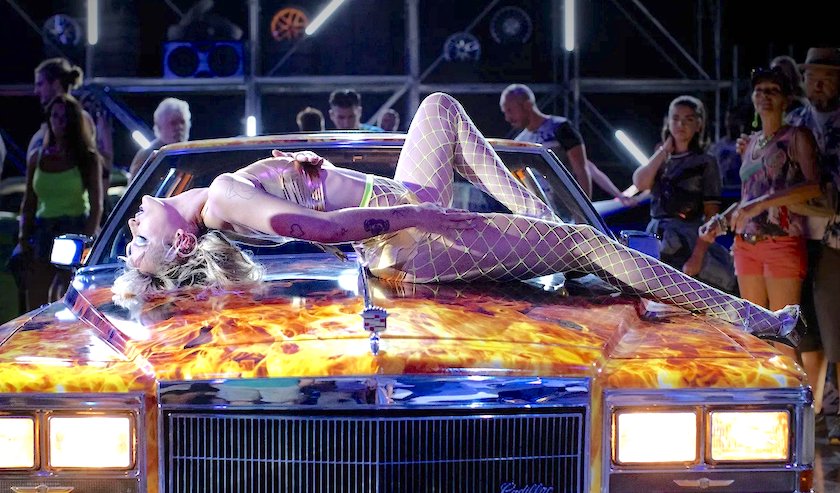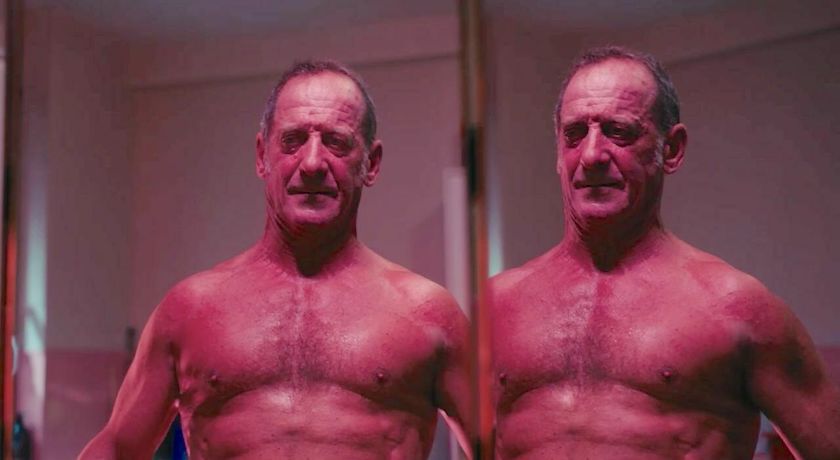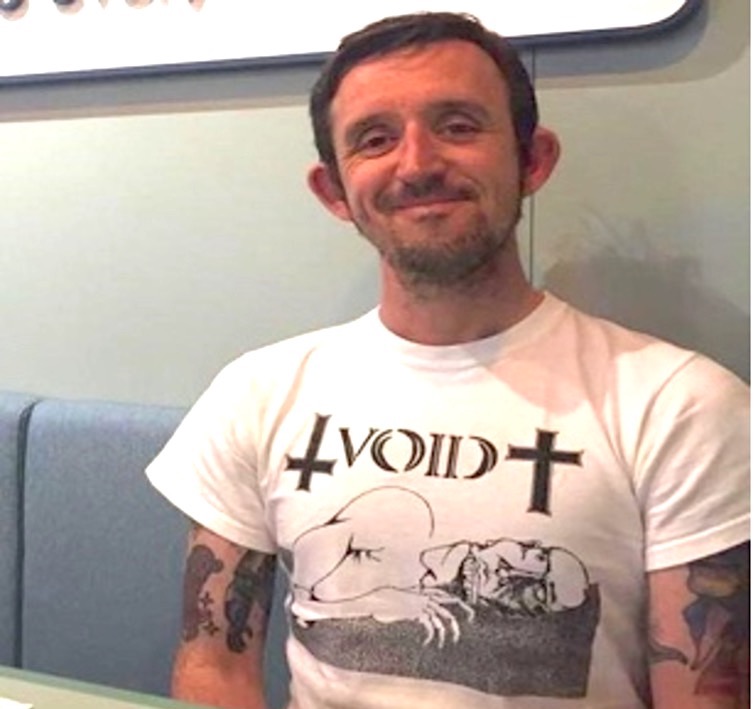
Titane is the second film from Julia Ducournau, following her acclaimed 2016 cannibal movie, Raw.
As a child, Alexia (Agathe Rousselle) is in a serious car crash and has a metal plate fitted inside her head. We meet her again as an adult, bearing a striking scar from the incident, working as a dancer, and living at home with her parents. She has an uncomfortably terse relationship with her father, who was driving the car at the time of the accident.
Events take a turn when Alexia murders a fan who is harassing her. It’s not her first homicide, it transpires, and Titane takes a step into some truly wild territory when, having had sex with a car (!), Alexia discovers she is pregnant and her body is producing jet black motor oil. If all this sounds a little weird, rest assured– it is! But Ducournau skilfully offsets the oddity with some ferocious and bloody violence, so the film remains resolutely a horror movie and is never laughable, despite how it might sound on paper.
As the police close in, Alexia goes on the run, assuming the identity of a missing person, Adrien. She goes to live with the boy’s father, Vincent (Vincent Lindon), at a fire station, pretending to be his son and hiding her pregnancy from everyone.
Titane gets off to a blistering start and this incendiary first half serves as both its blessing and its curse. The second half was only ever going to feel slow by comparison. When Alexia / Adrien moves into the fire station, it feels like we’re watching a completely different movie and, unfortunately, it starts to flag a little. The problem is not in the contrasting halves of its story. Amat Escalante proved you can have the best of both worlds in The Untamed (La región salvaje), beautifully weaving social drama amongst the tentacles of its Possession-homage plotline. Titane comes unstuck because we never know what drives Alexia, so to speak.
With so much focus on the body – overly sexualised dancing at the start, contrasted later by hiding her physicality through chest binding – it seems Titane might be trying to say something about gender identity. But… what, exactly? The only thing we know for certain is that Alexia becomes Adrien as a disguise, to escape capture. But outside of the too vague suggestion that her homicidal tendencies are the result of head trauma, we have no idea of her inner motivation. Alexia remains a constant enigma.

Motivational opacity notwithstanding, Alexia’s relationship with Vincent is one of trust, despite the initial dishonesty and strange forces corrupting her body. From the moment they meet, Vincent is certain his son has been returned to him. Any evidence to the contrary does not matter to him and this unconditional love and acceptance feels real and honest ““ another striking contrast to the unfeeling, casual violence of the beginning.
When talking about French horror, thoughts naturally turn to the New French Extremity, a term coined in the 2000s when France pushed the boundaries of horror cinema with ferocious and demented masterpieces like High Tension (Haute Tension), Martyrs and Inside (À l’intérieur). Perhaps it’s unfair to make comparisons to movies that were genuine groundbreakers, but the historical pedigree of French horror sets a very high bar which ““ like it or not ““ gives newcomers a lot to live up to.
So while credit is most certainly due to Titane for its weird and visceral sensibilities, it is perhaps not as transgressive as it would like you to believe. The wince-inducing violence is raw and feral, yet Alexia’s murder spree still owes a debt to Josie Ho’s angry rampage in Dream Home (Wai dor lei ah yat ho). While the horror pregnancy is an idea we’ve seen everywhere from the cerebral (Rosemary’s Baby) to the uncompromisingly graphic (Night of the Virgin).
Conceptually, Titane might sound like the kind of body horror David Cronenberg would get all hot and bothered about; and Canada’s legendary horror auteur is not an unfair reference point. But Titane‘s ideas find a far more accurate, if less accessible, reflection in Shinya Tsukamoto’s bewildering cyberpunk oddity, Tetsuo: The Iron Man, with both movies approaching the convergence of humanity and machine in strange and horrifying ways.
Make no mistake, Titane is still worth your time. But it’s one of those films you need to let settle in your grey matter for a while. My appreciation increased outside of the cinema, the more I let it sit with me. So while Titane‘s festival reputation might’ve gotten a bit carried away, it is still a unique and interesting movie that will leave you with lots to think about.











